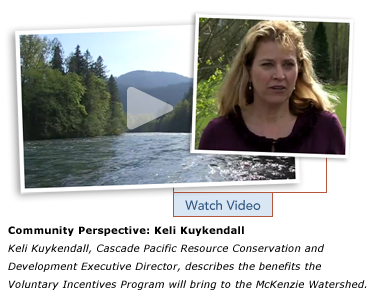Keli Kuykendall is passionate about the planet. An ecologist by training, she is excited by possibilities to conserve intact ecosystems so future generations may better understand them. “As long as we've been studying, we can't even begin to understand all the things the system can do for us,” she muses. “We can talk a little bit about the filtration of the water and the recycling of nutrients in riparian areas, but there are so many more things that we haven't discovered yet. I'm very excited that we're keeping ecosystems intact for future generations so that other people get a chance to experience it.”
As executive director of Cascade Pacific Resource Conservation and Development, Kuykendall will bring her dedication to financial administration of the VIP. Cascade Pacific is a non-profit organization working with rural communities to enhance quality of life through social, economic, and environmental improvements. It is one of EWEB's partner organizations and will assist with the VIP by holding program funds in trust and issuing dividends to landowners.
Cascade Pacific is just one of the organizations EWEB will bring together to form what it has initially termed a Watershed Investment District (WID). Many local non-profit and public-sector organizations with shared interests in the watershed will provide the expertise required to run the VIP on a day to day basis. Tasks include making an initial assessment of land quality, monitoring quality of enrolled lands to ensure continuing compliance, managing the program's fund, providing landowner dividends, negotiating agreements, and educating communities within the watershed about the program.
EWEB hopes to build symbiotic relationships with and among WID organizations. Rather than create a new organization to administer the VIP, EWEB will benefit from existing local organizations' expertise. Those organizations will benefit from their contracts with EWEB as well as from extending their relationships with partner organizations. Thinking about how the WID will work, Kuykendall says, “We have a lot of people who are already working toward this goal, preserving the intact systems, and so what the WID does is recognize those people and bring them together so that you get enhanced value from collaboration.”
Kuykendall thinks the VIP could change the watershed from the ground up. Many landowners have felt torn between working their lands for the earnings provided by harvesting resources and preserving some lands for the benefits provided by the ecosystem. Reflecting on that perennial conflict she says, “We are a community of people who really value the environment, but we are also a community of people who work the land." The VIP will help to ease the conflict between those two goals by providing an opportunity to work the land in a new way. Maintaining healthy riparian areas still requires landowners' efforts but to promote and preserve the land's natural condition.
This is the fundamental reason the VIP excites so many: it recognizes the intrinsic and monetary value in the ability of riparian areas to provide filtration services that cannot be replicated through engineering and cannot be mimicked cost-effectively. Unlike traditional compensation for natural resources which values the goods of resource extraction or harvesting, the VIP compensates landowners for the services the intact resources provide.
Kuykendall understands the enduring benefits of healthy ecosystems. She therefore readily recognizes ways in which the VIP will benefit today's communities as well as future generations, farmers, water customers, and fish and wildlife. Beyond the watershed, she sees others enjoying the “intrinsic value that people have knowing that we're doing something good. Even if it's not their land, they know that the McKenzie River is being protected, that there are a lot of people working to keep Oregon this beautiful, lush, green place that it is. And so we get – all of us – a benefit in our hearts because we know we're doing a good thing on the McKenzie River.”

